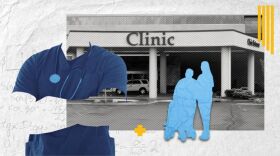-
A new report found that nearly 10% of median household income in Missouri and Kansas goes toward deductibles and premiums. At that level, economists say those households are underinsured.
-
A new partnership will create a theranostics health care platform in the region with radiopharmaceutical production and therapy, molecular imaging, and clinical trials all at the same location. One Kansas City health care system will be among the first to offer the treatment to children.
-
Suicide deaths crept up last year in Johnson County, Kansas, but officials warn the numbers are preliminary and don’t signify a trend. Public health authorities say they will adjust their efforts to focus more closely on access to guns, mental health care, and the social factors that might lead a person to take their own life.
-
Kansas has one of the highest rates of Parkinson’s disease diagnoses. Groups there are helping people slow the progression of the disease through activities including exercise and art classes. Plus: Nipple tattoos are an option for the many American women who survive breast cancer and end their treatment looking for a way to reconnect with themselves and their bodies.
-
A trial that could determine the future of abortion access in Missouri has wrapped up, and the decision is now in the hands of a judge. Planned Parenthood is suing to get several laws targeting abortion providers off the books, but the state got its chance this past week to defend the regulations.
-
For much of Kansas City’s homeless population, seeking medical treatment is not only hard, it can also be demeaning. One nurse practitioner made it her mission to change that.
-
Small business owners make up many of the millions of people who are facing higher premiums for health care, after Congress allowed COVID-era enhanced subsidies for the Affordable Care Act to lapse. Because of the higher prices, two Kansas City-area business owners say they’ve had to adjust their business strategies.
-
These state hospitals can’t find full-time staff. Contract nurses are needed to serve patients, but expenses keep going up.
-
Congress is poised to leave for a scheduled holiday recess without a solution for addressing the expiration of enhanced subsidies for Affordable Care Act marketplace plans. "I do know the effect on people at home," Hawley told NPR after the Senate vote.
-
Health care for some immigrants was stripped away more than three months ago when President Donald Trump rescinded a rule that offered health care plans to people who migrated to the U.S. as children.
-
Current and former employees at Jefferson City Correctional Center say the nursing shortage is causing unrest. They blame the state's contractor, Centurion Health.
-
If the end-of-year expiration date is not extended, enhanced ACA marketplace participants will see premiums rise anywhere between $300 and $1000. Six in 10 of the respondents to a KFF poll said a $300 increase would put an unsustainable strain on their budget.
Play Live Radio
Next Up:
0:00
0:00
Available On Air Stations










